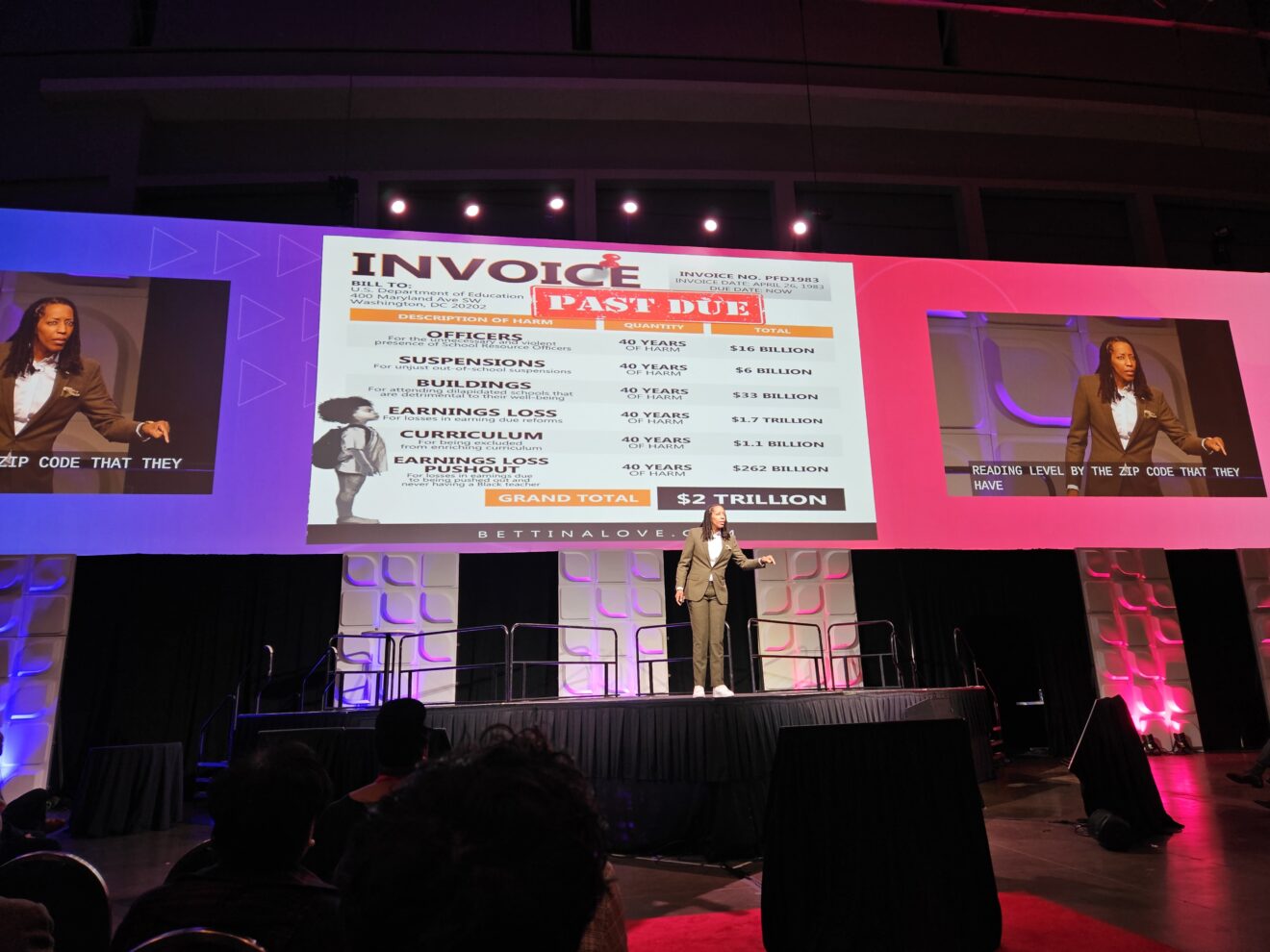ASCD 2024 got underway Saturday with a full day of programming, starting with a keynote address from activist and professor Bettina Love. Educators crowded the main hall to hear Love discuss what education reform needs to be, why DEI is not the magic solution and how schools can help make equality a reality.
Here are highlights from her talk.
The greatest generation ever
People born in the 80s and 90s might be the greatest generation ever, according to Love.
“We are the post-civil rights generation,” Love said. “We are the hip hop generation; we are also the dream generation. We are the generation that our parents and grandparents fought for.”
But the 80s and 90s also brought change and upheaval to Black communities. Crime reform and education reform converged — creating programs such as D.A.R.E and No Child Left Behind — and new language and labels emerged.
“These folks who were young and lively were no longer just children. We were labeled crack babies, super predators and thugs,” said Love. “The war on drugs was a war on Black people.”
Curriculum and representation
Students need to see themselves in their learning content, Love said. It reinforces their identity and potential.
“Curriculum tells young people who are important. Curriculum tells young people who has contributed to this society,” said Love. “When you erase me from the curriculum you erase what you have done to me.”
Educators must make an effort to understand their students’ culture and experiences.
“If you don’t know what they need, if you don’t know their culture, if you don’t know their history, if you don’t know who they are, if you believe all the myths and lies about Black and brown people when you walk into that classroom, you will do wrong,” Love said.
Integration and antiracism
Antiracism is more than just avoiding the use of racial slurs, Love asserted.
“It’s about where you live, the decisions you make every day, about the books you bring into your home,” Love said. “So many decisions we make daily are racial. How do you start to think about that? How do you bring that to your classroom?”
Love talked about Ruby Bridges, who was the first Black child to attend William Frantz Elementary School in Louisiana, formerly a white-only school. Bridges was part of the early school integration efforts in the South. Just six years old at the time, Bridges spent her first year alone in her classroom — many white parents removed their children from the school and only one teacher agreed to teach her. Federal marshals escorted her to and from school to ensure her safety.
Understanding the sacrifices made by families like the Bridges is integral to supporting the goals of antiracism.
“I want you to think about this, as parents, as folks who love children. Would you send your child to this?” Love asked. “Would you send your children to a school where no one looks like them? Where the curriculum doesn’t benefit them? Where they’re punished for just being who they are? You wouldn’t. That is the sacrifice that the Bridges family made so we can call ourselves a democracy.”
The lie of DEI
Love warned audience members against putting their faith in diversity, equity and inclusion efforts.
“DEI is a trap,” Love said, stating that many of these programs lack sufficient resources and support. “DEI that has no staff, no power, no way to make decisions — that’s not equity. The solution for me is not DEI — the solution for me is reparations.”
Love called for educators to become allies in the antiracism cause.
“Use your privilege. Cash out!” Love told the audience. “Do what needs to be done. That’s what it means to be an ally. You don’t got to be big. You don’t got to be shouting. You just do what needs to be done.”
Changing the system
Real justice starts by changing the structure, Love said.
“You can’t do this work without understanding that this system has been structured and engineered to create inequality,” Love said. “Poverty in this country is a policy. The idea that we don’t fund education in this country adequately is a policy. So we have to understand that if we can engineer inequality, we can engineer equality.”
Stay the course
The journey toward equality is a long one, but the Black spirit is relentless in this fight, said Love.
“Black folks do not give up. We don’t!” Love said. “We organize, we strategize, we march, we protest, we keep going. We keep fighting, we keep dreaming. That’s what’s radical about us. You have to see that to teach us. You have to believe that to teach us. You have to believe that what we’ve fought for helps you. It’s connected to you.”
Kanoe Namahoe is the editorial director of SmartBrief Education & Business Services. Reach her at [email protected].
